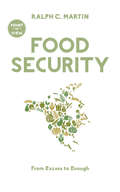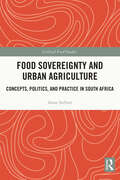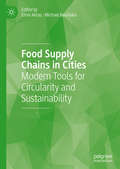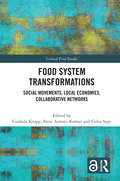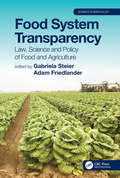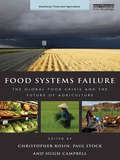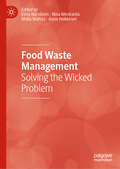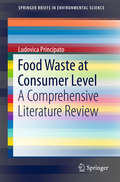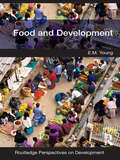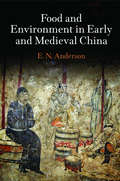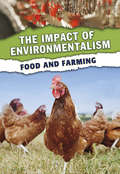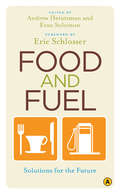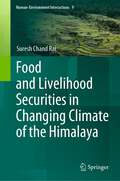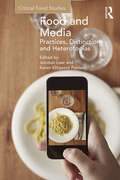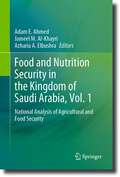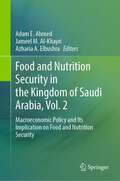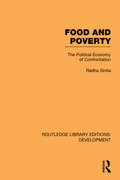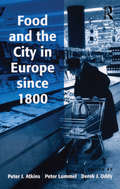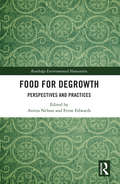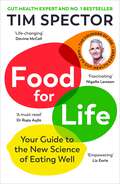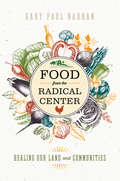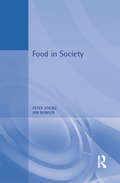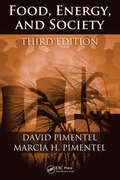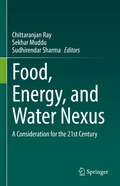- Table View
- List View
Food Security: From Excess to Enough (Point of View #9)
by Ralph C. MartinCanadians are failing to balance reasonable food consumption with sufficient and sustainable production. The modern agricultural system is producing more and more food. Too much food. The cost is enormous: excess nutrients are contaminating the air and water; soil is being depleted; species loss is plunging us toward the sixth extinction; and farmers, racking up debt, are increasingly vulnerable to economic and climatic shifts. At the same time, people are consuming too much food. Two-thirds of health-care costs in Canada can be attributed to chronic diseases associated with unhealthy eating. And then there is the waste — householders, food processors, distributors, wholesalers, and retailers collectively waste 40 percent of the food produced. A radical rethink is required. We need to move from excess to enough.
Food Sovereignty and Urban Agriculture: Concepts, Politics, and Practice in South Africa (Critical Food Studies)
by Anne SiebertThis book analyses the interplay of urban agriculture and food sovereignty through the innovative lens of the "critical urban food perspective". It focuses on the mobilisation of urban food producers as a powerful response to highly exclusionary dynamics in the agri-food system including insufficient food access and disastrous land dispossessions. This volume particularly aims to fill the gap in the current literature by engaging with food sovereignty discourses and movements in urban areas. Related activism of urban food producers in the Global South remains underrepresented in practice and in literature. Therefore, this book engages with the lived realities of an urban agriculture initiative in George, South Africa. Building on theoretical notions of the "right to the city" and "everyday forms of resistance", the book illuminates how deprived food producers expose inequalities and propose alternatives. The findings of in-depth empirical research reveal that dwellers perceive farming as a mean to overcome historical segregation, high food prices, and unhealthy nutrition. Hence, they breathe life into food sovereignty in practice and suggest further alliances beyond the city. The book will be of interest to scholars and students of alternative food politics, agrarian transformation, and food movements as well as rural-urban intersections.
Food Supply Chains in Cities: Modern Tools for Circularity and Sustainability
by Michael Bourlakis Emel AktasThis book analyses the food sector which has economic and political significance for all countries. A highly fragmented and heavily regulated sector, it has become increasingly complex owing to globalisation and geographical decoupling of production and consumption activities. The urban population of the world has grown from 746 million in 1950 to 3.9 billion in 2014 and more than 70% of the population is anticipated to be living in urban areas by 2050. Food supply chains play a vital role in feeding the world’s most populous cities, whilst underpinning transportation, storage, distribution, and waste management activities for the sustainability of the urban environment. That is why, this book presents the latest research on food supply chain management with a focus on urbanisation. The contributions involve food distribution in cities, food waste minimisation, and food security with a focus on models and approaches to achieve more sustainable and circular food supply chains.
Food System Sustainability
by Catherine Esnouf Marie Russel Nicolas Bricas Catherine Esnouf Marie RusselAs western-style food systems extend further around the world, food sustainability is becoming an increasingly important issue. Such systems are not sustainable in terms of their consumption of resources, their impact on ecosystems or their effect on health and social inequality. From 2009 to 2011, the duALIne project, led by INRA and CIRAD, assembled a team of experts to investigate food systems downstream of the farm, from the farm gate, to consumption and the disposal of waste. Representing a diverse range of backgrounds spanning academia and the public and private sectors, the project aimed to review the international literature and identify major gaps in our knowledge. This book brings together its key conclusions and insights, presenting state-of-the-art research in food sustainability and identifying priority areas for further study. It will provide a valuable resource for researchers, decision-makers and stakeholders in the food industry.
Food System Transformations: Social Movements, Local Economies, Collaborative Networks (Critical Food Studies)
by Cordula KroppThis book examines the role of local food movements, enterprises and networks in the transformation of the currently unsustainable global food system. It explores a series of innovations designed to re-integrate sustainable modes of food production and encourage food sovereignty. It provides detailed insights into a specialised network of social actors collaborating in novel ways and creating new economic arrangements across different geographical locales. In working to devise ‘local solutions to global problems’, the initiatives explored in the book represent a ‘second-generation’ food social movement which is less preoccupied with distinctive local qualities than with building socially just food systems aimed at delivering healthy nutrition worldwide. Drawing on fieldwork undertaken in sites across Europe, the USA and Brazil, the book provides a rich collection of case studies that offer a fresh perspective on the role of grassroots action in the transition to more sustainable food production systems. Addressing a substantive gap in the literature that falls between global analyses of the contemporary food system and highly localised case studies, the book will appeal to those teaching food studies and those conducting research on civic food initiatives or on environmental social movements more generally.
Food System Transparency: Law, Science and Policy of Food and Agriculture (Advances in Agroecology)
by Gabriela Steier Adam FriedlanderThis book brings together an international group of agriculture and food lawyers and scientists to define the field of Food System Transparency in three parts: the big picture, food safety and health, and the global view. Each part adds to the whole but zooms in through a unique lens. Investigating social, economic, political, scientific and legal frameworks, this comprehensive volume addresses topics such as food authenticity, agroecological evaluations, and consumer protection. Interwoven themes of transparency contextualize concepts of food safety, information sharing and regulatory opportunities at a local and global scale. Editors’ notes provide blended legal and scientific commentary to facilitate further discussion and context within the classroom. Advantages of this volume include: Chapters written by foremost international experts in their fields Editors’ notes written for classroom use and background information Figures and tables providing illustrations of important concepts Case studies delivering practicality and in-depth analysis to current events A special chapter on COVID-19 and its implications for the food system This book is important reading for graduate-level students, legal scholars, nonlegal academics, advocates for food system transparency and resilience, agroecology and environmental conservation, and practitioners in any cross-disciplinary areas relating to food policy. It will be of interest to all those who seek to deepen their understanding of the concepts and trends surrounding the information that centers around our food system, both domestically in the United States and the European Union, as well as in many major trading nations such as China.Check out the Support Materials tab on www.routledge.com/9780367440367 for a short video previewing some the key themes in the book.
Food Systems Failure: The Global Food Crisis and the Future of Agriculture (Earthscan Food and Agriculture)
by Hugh Campbell Paul Stock Christopher RosinThis book provides a critical assessment of the contemporary global food system in light of the heightening food crisis, as evidence of its failure to achieve food security for the world's population. A key aspect of this failure is identified in the neoliberal strategies which emphasize industrial efficiencies, commodity production and free trade-ideologies that underlie agricultural and food policies in what are frequently referred to as 'developed countries'. The book examines both the contradictions in the global food system as well as the implications of existing ideologies of production associated with commodity industrial agriculture using evidence from relevant international case studies. The book's first section presents the context of the food crisis with contributions from leading international academics and food policy activists, including climate scientists, ecologists and social scientists. These contributions identify current contradictions in policy and practice that impede solutions to the food crisis. Set within this context, the second section assesses current conditions in the global food system, including economic viability, sustainability and productivity. Case study analyses of regions exposed to neoliberal policy at the production end of the system provide insights into both current challenges to feeding the world, as well as alternative strategies for creating a more just and moral food system.
Food Waste Management: Solving the Wicked Problem
by Elina Närvänen Nina Mesiranta Malla Mattila Anna HeikkinenThis book focuses on the crucial sustainability challenge of reducing food waste at the level of consumer-society. Providing an in-depth, research-based overview of the multifaceted problem, it considers environmental, economic, social and ethical factors. Perspectives included in the book address households, consumers, and organizations, and their role in reducing food waste. Rather than focusing upon the reasons for food waste itself, the chapters develop research-based solutions for the problem, providing a much-needed solution-orientated approach that takes multiple perspectives into account.Chapters 1, 2, 12 and 16 of this book are available open access under a CC BY 4.0 license at link.springer.com
Food Waste at Consumer Level: A Comprehensive Literature Review (SpringerBriefs in Environmental Science)
by Ludovica PrincipatoThis book presents what is the state-of-the-art in the field of the food waste phenomenon at consumer level, including a thorough literature review, and it highlights trends in the field. It provides a comprehensive starting point for future research. Food waste represents a major public policy issue, which is included in the UN Sustainable Development Goals. In this context, the present work identifies the most important definitions given to food waste and its environmental, social and economic impacts. With a comprehensive literature review that covers a forty-year time span (1977-2017), this book highlights the multiple, complex facets of food waste at the consumer level. Drawing from behavioural and marketing theories, it proposes a new theoretical framework with the aim to better explain food waste behaviour. Extensive research is being carried out on the main worldwide initiatives (both public and private) and food policies aimed at tackling the phenomenon.
Food and Development (Routledge Perspectives on Development)
by E. M. YoungThe relationship between food and development has always been controversial. Over the last thirty years, development in the north and south has failed to deliver people a decent diet. While some people have too little food and die as a consequence, some people have too much food and die from associated diseases. Furthermore, some methods of food production create social dislocation and deadly environments where biodiversity is eroded and pollution is rampant. While guaranteeing enough food for the world’s inhabitants continues to be a serious challenge, new issues about food have emerged. Food and Development is a lively and lucidly written text which provides a clear and accessible introduction to these complex and diverse food related problems. It explores the continued prevalence of mass under nutrition in the developing world; acute food crises in some places associated with conflict; the emergence of over nutrition in the developing world and the vulnerability of the contemporary global food production system. The text identifies the major problems and analyzes factors at international, national and local scales to understand their continued prevalence. The book concludes by evaluating the potential of some oppositional forces to challenge the hegemony of the contemporary food system. This timely and original text will be invaluable to undergraduates interested in the challenges surrounding food and development. The text is richly filled with case studies from the Global North and South to illustrate the nature and extent of these urgent issues and their interrelated nature. Each chapter contains a range of features to assist undergraduate learning, including: learning objective, key concepts, summaries, discussion questions, further reading and websites, and follow up activities.
Food and Environment in Early and Medieval China (Encounters with Asia)
by E. N. AndersonChinese food is one of the most recognizable and widely consumed cuisines in the world. Almost no town on earth is without a Chinese restaurant of some kind, and Chinese canned, frozen, and preserved foods are available in shops from Nairobi to Quito. But the particulars of Chinese cuisine vary widely from place to place as its major ingredients and techniques have been adapted to local agriculture and taste profiles. To trace the roots of Chinese foodways, one must look back to traditional food systems before the early days of globalization.Food and Environment in Early and Medieval China traces the development of the food systems that coincided with China's emergence as an empire. Before extensive trade and cultural exchange with Europe was established, Chinese farmers and agriculturalists developed systems that used resources in sustainable and efficient ways, permitting intensive and productive techniques to survive over millennia. Fields, gardens, semiwild lands, managed forests, and specialized agricultural landscapes all became part of an integrated network that produced maximum nutrients with minimal input—though not without some environmental cost. E. N. Anderson examines premodern China's vast, active network of trade and contact, such as the routes from Central Asia to Eurasia and the slow introduction of Western foods and medicines under the Mongol Empire. Bringing together a number of new findings from archaeology, history, and field studies of environmental management, Food and Environment in Early and Medieval China provides an updated picture of language relationships, cultural innovations, and intercultural exchanges.
Food and Farming (The Impact of Environmentalism)
by Jen GreenWe are all aware of the importance of the environment - it's in the news, it affects our behavior and the decisions we make every day. But what actual impact has environmental thinking had on the world around us? This thought-provoking book looks at the way changing ideas about the environment and sustainability have affected the way we obtain our food, and will do so in the future.
Food and Fuel: Solutions for the Future
by Evan Solomon Andrew HeintzmanThe twenty-first century has been dominated by two major global crises: a scarcity of food and fuel. Both have had detrimental effects on the environment and both are at the root of the fragile health of the global economy. Combining the best of the critically acclaimed Fuelling the Future and Feeding the Future, this timely and provocative collection of essays from leading thinkers such as Thomas Homer-Dixon, Gordon Laird, Jeremy Rifkin, Frances Moore Lappe, and Anna Lappe offers valuable strategies to combat global famine and fast-food fat; business models for sustainable food production and power sources; and descriptions of emerging technologies and sciences.
Food and Livelihood Securities in Changing Climate of the Himalaya (Human-Environment Interactions #9)
by Suresh Chand RaiThis book provides viewpoints on a cross-sectoral, multiscale assessment of food and livelihood security in changing climate, the main global threats of the 21st century. Climate change, directly and indirectly, influences several aspects of food security, primarily in the farming and livestock sectors. The farming sector is the main source of income and employment for about 70% of the Himalayan populace. However, there has been no such study that has comprehensively covered these aspects.Additionally, the book offers critical mitigation measures to adapt to climate change and other uncertainties. The agricultural diversities and livelihood security in the Himalayan region will be sustainable only if farmers applied suggested mitigation measures correctly.This title is appropriate for postgraduates and research scholars of social sciences, environmental sciences, and agricultural sciences. Regional planners, government officers, NGOs, and many other people who are interested in the Himalayan region as well as local communities will be also beneficial.
Food and Media: Practices, Distinctions and Heterotopias (Critical Food Studies)
by Jonatan Leer Karen Klitgaard PovlsenFood is everywhere in contemporary mediascapes, as witnessed by the increase in cookbooks, food magazines, television cookery shows, online blogs, recipes, news items and social media posts about food. This mediatization of food means that the media often interplays between food consumption and everyday practices, between private and political matters and between individuals, groups, and societies. This volume argues that contemporary food studies need to pay more attention to the significance of media in relation to how we 'do' food. Understanding food media is particularly central to the diverse contemporary social and cultural practices of food where media use plays an increasingly important but also differentiated and differentiating role in both large-scale decisions and most people's everyday practices. The contributions in this book offer critical studies of food media discourses and of media users' interpretations, negotiations and uses that construct places and spaces as well as possible identities and everyday practices of sameness or otherness that might form new, or renew old food politics.
Food and Nutrition Security in the Kingdom of Saudi Arabia, Vol. 1: National Analysis of Agricultural and Food Security
by Jameel M. Al-Khayri Adam E. Ahmed Azharia A. ElbushraFood and nutrition security is a major concern for Saudi Arabia and the surrounding regions due to the range of challenges they face. These challenges include limited agricultural resources, low self-sufficiency in key food staples, climate change, and high levels of food loss and waste. This book aims to evaluate and analyze the current situation and future prospects of food and nutrition security in Saudi Arabia. Additionally, it seeks to analyze and assess the roles and functions of various institutions related to food security, providing a deeper understanding of the complex problems associated with it. Furthermore, this book aligns with Kingdom Vision 2030, which includes a set of strategies and programs focused on agriculture, food, and water security. It also aligns with the institutional identity of King Faisal University's "Food Security and Environmental Sustainability".The book consists of four volumes. Volume 1, entitled "National Analysis of Agriculture and Food Security" aims to assess the current state of food security in Saudi Arabia, covering key aspects such as agriculture and food resources, food systems, crops, livestock, poultry, fisheries, animal health, food loss and waste, transportation and strategic reserve infrastructure, food security institutions, population, agricultural extension, climate change, agricultural mechanization, smart agriculture, and the utilization of solar energy.This book is highly significant for professionals, researchers, policymakers, and entrepreneurs involved in food and nutrition security in Saudi Arabia, the Gulf Cooperation Council, and various national and international organizations. It offers a comprehensive analysis of the obstacles and possibilities in ensuring food and nutrition security, as well as presenting practical approaches to address these issues. Additionally, graduate students studying in fields related to food and nutrition security will benefit from this book.
Food and Nutrition Security in the Kingdom of Saudi Arabia, Vol. 2: Macroeconomic Policy and Its Implication on Food and Nutrition Security
by Jameel M. Al-Khayri Adam E. Ahmed Azharia A. ElbushraFood and nutrition security is a major concern for Saudi Arabia and the surrounding regions due to the range of challenges they face. These challenges include limited agricultural resources, low self-sufficiency in key food staples, climate change, and high levels of food loss and waste. This book aims to evaluate and analyze the current situation and future prospects of food and nutrition security in Saudi Arabia. Additionally, it seeks to analyze and assess the roles and functions of various institutions related to food security, providing a deeper understanding of the complex problems associated with it. Furthermore, this book aligns with Kingdom Vision 2030, which includes a set of strategies and programs focused on agriculture, food, and water security. It also aligns with the institutional identity of King Faisal University's "Food Security and Environmental Sustainability".The book consists of four volumes. Volume 2 is entitled "Macroeconomic Policy Implications on Food and Nutrition Security". It covers various areas, including food price, loss and waste, processing, finance, trade, investment, quality and safety, consumption patterns, climate change, early warning systems, nutrition institutions, oil revenue, and the significance of date palm and Hassawi rice, genetically modified food, and edible insects in ensuring food and nutritional security.This book is highly significant for professionals, researchers, policymakers, and entrepreneurs involved in food and nutrition security in Saudi Arabia, the Gulf Cooperation Council, and various national and international organizations. It offers a comprehensive analysis of the obstacles and possibilities in ensuring food and nutrition security, as well as presenting practical approaches to address these issues. Additionally, graduate students studying in fields related to food and nutrition security will benefit from this book.
Food and Poverty: The Political Economy of Confrontation (Routledge Library Editions: Development)
by Radha SinhaFirst published in 1976, this book deals with contemporary tensions between the West and the Third World, caused by hunger, malnutrition and poverty, perpetuated by an imbalance in the distribution of world resources. The book deals with the issue of malnutrition in the Third World, which owes much more to poverty and unemployment than to agricultural failure. The author also believes that population control can do little in the absence of a more equitable distribution of world resources and political power within and between countries involving a fundamental change in ideology and education. This is a challenging and critical book, whose arguments cannot be ignored by anyone concerned with the creation of a just and stable world order.
Food and the City in Europe since 1800
by Peter LummelThis fascinating volume examines the impact that rapid urbanization has had upon diets and food systems throughout Western Europe over the past two centuries. Bringing together studies from across the continent, it stresses the fundamental links between key changes in European social history and food systems, food cultures and food politics. Contributors respond to a number of important questions, including: when and how did local food production cease to be sufficient for the city and when did improved transport conditions and liberal commercial relations replace local by supra-regional food supplies? How far did the food industry contribute to improved living conditions in cities? What influence did urban consumers have? Food and the City in Europe since 1800 also examines issues of food hygiene and health impacts in cities, looks at various food innovations and how ’new’ foods often first gained acceptance in cities, and explores how eating fashions have changed over the centuries.
Food for Degrowth: Perspectives and Practices (Routledge Environmental Humanities)
by Anitra Nelson and Ferne EdwardsThis collection breaks new ground by investigating applications of degrowth in a range of geographic, practical and theoretical contexts along the food chain. Degrowth challenges growth and advocates for everyday practices that limit socio-metabolic energy and material flows within planetary constraints. As such, the editors intend to map possibilities for food for degrowth to become established as a field of studies. International contributors offer a range of examples and possibilities to develop more sustainable, localised, resilient and healthy food systems using degrowth principles of sufficiency, frugal abundance, security, autonomy and conviviality. Chapters are clustered in parts that critically examine food for degrowth in spheres of the household, collectives, networks, and narratives of broader activism and discourses. Themes include broadening and deepening concepts of care in food provisioning and social contexts; critically applying appropriate technologies; appreciating and integrating Indigenous perspectives; challenging notions of 'waste', 'circular economies' and commodification; and addressing the ever-present impacts of market logic framed by growth. This book will be of greatest interest to students and scholars of critical food studies, sustainability studies, urban political ecology, geography, environmental studies such as environmental sociology, anthropology, ethnography, ecological economics and urban design and planning.
Food for Life: The New Science of Eating Well, by the Sunday Times bestselling author of SPOON-FED
by Tim Spector'Life-changing' DAVINA McCALL'A must-read' Dr RUPY AUJLA'Fascinating' NIGELLA LAWSON'Empowering' LIZ EARLE**AS HEARD ON THE DIARY OF A CEO PODCAST**Food is our greatest ally for good health, but the question of what to eat in the age of ultra-processed food has never seemed so complicated.Drawing on cutting-edge research and personal insights, Professor Tim Spector offers clear answers in this definitive, easy-to-follow guide to the new science of eating well.Empowering and practical, Food for Life is nothing less than a new approach to how to eat - for our health and the health of the planet.‘No fads, no nonsense, just practical, science-based advice on how to eat well’ Daily Mail, Books of the Year'A rigorously academic book that welcomes the layperson with open arms' The Times** A THE TIMES and SUNDAY TIMES BOOK OF THE YEAR**** WINNER OF THE FORTNUM & MASON SPECIAL AWARD **
Food from the Radical Center: Healing Our Land and Communities
by Gary Paul Nabhan"Informational and inspirational."—BooklistAmerica has never felt more divided. But in the midst of all the acrimony comes one of the most promising movements in our country's history. People of all races, faiths, and political persuasions are coming together to restore America's natural wealth: its ability to produce healthy foods.In Food from the Radical Center, Gary Nabhan tells the stories of diverse communities who are getting their hands dirty and bringing back North America's unique fare: bison, sturgeon, camas lilies, ancient grains, turkeys, and more. These efforts have united people from the left and right, rural and urban, faith-based and science-based, in game-changing collaborations. Their successes are extraordinary by any measure, whether economic, ecological, or social. In fact, the restoration of land and rare species has provided—dollar for dollar—one of the best returns on investment of any conservation initiative.As a leading thinker and seasoned practitioner in biocultural conservation, Nabhan offers a truly unique perspective on the movement. He draws on fifty years of work with community-based projects around the nation, from the desert Southwest to the low country of the Southeast. Yet Nabhan's most enduring legacy may be his message of hope: a vision of a new environmentalism that is just and inclusive, allowing former adversaries to commune over delicious foods.
Food in Society: Economy, Culture, Geography (A\hodder Arnold Publication)
by Peter Atkins Ian BowlerWho can deny the significance of food? It has a central role in our health and pleasure as well as in our economy, politics and culture. Food in Society provides a social science perspective on food systems and demonstrates the rich variety of disciplinary and theoretical contexts of food studies.While hunger and malnutrition remain a reality in many countries, for some food has become an experience rather than a sustenance. This book addresses the different worldwide understandings of food through thematic chapters and a wide range of material including: description of the political economy of the food chain, from production to the point of sale; analysis of global issues of supply and demand; critical debate of environmental and health aspects of food, including GM food, the role of habits, taboos, age and gender in food consumption.Each chapter contains a guide to further reading and to websites of relevance to food. Extensively illustrated, this book is essential reading for students of food studies in the social sciences and humanities.
Food, Energy, and Society
by David Pimentel Marcia H. PimentelSince the publication of the first edition of Food, Energy, and Society, the world's natural resources have become even more diminished due to the rapid expansion of the global human population. We are faced with dwindling food supplies in certain geographic areas, increasing pressure on energy resources, and the imminent extinction of many
Food, Energy, and Water Nexus: A Consideration for the 21st Century
by Chittaranjan Ray Sekhar Muddu Sudhirendar SharmaIn this book, major issues surrounding importance of water and energy for food security in the United States and India are described representing two extremes in yield, irrigation efficiency, and automation. The farming systems in these two countries face different risks in terms of climatic shifts and systems’ resiliency to handle the shocks. One may have comparative advantage over the other, but both are susceptible. Innovations in irrigation for food and fuel production, improvements in nitrogen and water use efficiency, and rural sociological issues are discussed here. We also look into some of the unintended consequences of high productivity agriculture in terms of surface and ground water quality and impacts on ecosystem services. Finally, we present ways to move forward to meet the food demands in the next half-century in both countries. As the current world population of 7 billion is expected to reach or exceed 10 billion in the next 40 years, there will be significant additional demand for food. A rising middle class and its preference for a meat-based diet also increases the demand for animal feed. This additional food and feed production needs special considerations in water and energy management besides the development of appropriate crop hybrids to withstand future climatic shifts and other environmental factors. A resilient agricultural landscapes will also be needed to withstand climatic fluctuations, disease pressures, etc. While the upper and many middle income countries have made significant improvements in crop yield due to pressurized irrigation and automation in farming systems, the lower income countries are struggling with yield enhancements due to such limitations. The rise in population is expected to be more in Sub-Sharan Africa and Middle East (Low to middle-income countries) where the crop yields are expected to be low.
